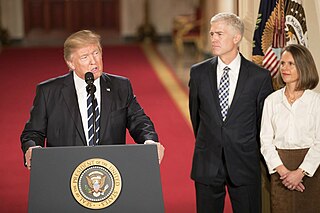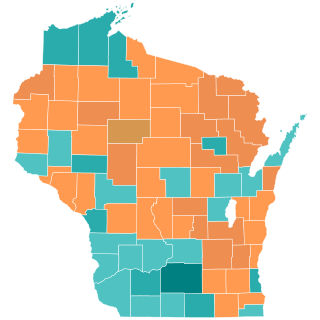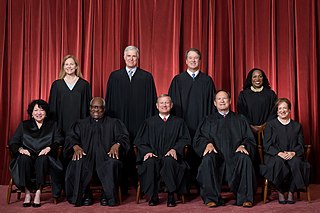
The Supreme Court of the United States (SCOTUS) is the highest court in the federal judiciary of the United States. It has ultimate appellate jurisdiction over all U.S. federal court cases, and over state court cases that turn on questions of U.S. constitutional or federal law. It also has original jurisdiction over a narrow range of cases, specifically "all Cases affecting Ambassadors, other public Ministers and Consuls, and those in which a State shall be Party." The court holds the power of judicial review, the ability to invalidate a statute for violating a provision of the Constitution. It is also able to strike down presidential directives for violating either the Constitution or statutory law.

The Federalist Society for Law and Public Policy Studies (FedSoc) is an American conservative and libertarian legal organization that advocates for a textualist and originalist interpretation of the U.S. Constitution. Headquartered in Washington, D.C., it has chapters at more than 200 law schools and features student, lawyer, and faculty divisions; the lawyers division comprises more than 70,000 practicing attorneys in ninety cities. Through speaking events, lectures, and other activities, it provides a forum for legal experts of opposing conservative views to interact with members of the legal profession, the judiciary, and the legal academy. It is one of the most influential legal organizations in the United States.

David Hackett Souter is an American lawyer and jurist who served as an associate justice of the U.S. Supreme Court from 1990 until his retirement in 2009. Appointed by President George H. W. Bush to fill the seat that had been vacated by William J. Brennan Jr., Souter sat on both the Rehnquist and the Roberts courts.

Speculation abounded over potential nominations to the Supreme Court of the United States by President George W. Bush since before his presidency.

Samuel Anthony Alito Jr. is an American jurist who serves as an associate justice of the Supreme Court of the United States. He was nominated to the high court by President George W. Bush on October 31, 2005, and has served on it since January 31, 2006. After Antonin Scalia, Alito is the second Italian American justice to serve on the U.S. Supreme Court.

The Judicial Procedures Reform Bill of 1937, frequently called the "court-packing plan", was a legislative initiative proposed by U.S. President Franklin D. Roosevelt to add more justices to the U.S. Supreme Court in order to obtain favorable rulings regarding New Deal legislation that the Court had ruled unconstitutional. The central provision of the bill would have granted the president power to appoint an additional justice to the U.S. Supreme Court, up to a maximum of six, for every member of the court over the age of 70 years.

The Supreme Court of Japan, located in Hayabusachō, Chiyoda, Tokyo, is the highest court in Japan. It has ultimate judicial authority to interpret the Japanese constitution and decide questions of national law. It has the power of judicial review, which allows it to determine the constitutionality of any law or official act.
A Segal–Cover score is an attempt to measure the "perceived qualifications and ideology" of nominees to the United States Supreme Court. The scores are created by analyzing pre-confirmation newspaper editorials regarding the nominations from The New York Times, Washington Post, Chicago Tribune, Los Angeles Times, St. Louis Post-Dispatch, and The Wall Street Journal. Each nominee receives two scores that range from 0 to 1 based on the average score of all articles from these sources:

Neil Patrick Crooks was an American lawyer. He was a justice of the Wisconsin Supreme Court from 1996 until his death in 2015. He was appointed as a county judge by a Democratic governor, later professing conservatism as a Supreme Court candidate in 1995 and 1996. In his later years, Crooks gained notice as a perceived judicial moderate and swing vote on a court otherwise divided into two ideological blocs.
"The Supremes" is the seventeenth episode of the fifth season of American serial political drama television series The West Wing. It originally aired on NBC on March 24, 2004. In "The Supremes", the White House senior staff, under Democratic President Josiah Bartlet, looks to nominate a judge to the Supreme Court of the United States when Josh comes up with a plan to, instead of nominating a centrist to the seat, nominate one liberal and one conservative candidate to two seats on the Court. The episode was met with mixed reception, although it was later noted the show bore similarities to the 2016 death and replacement of real-life Supreme Court Justice Antonin Scalia.

Boyce Ficklen Martin Jr. was a United States circuit judge of the United States Court of Appeals for the Sixth Circuit. Appointed by President Jimmy Carter in 1979, Martin served as chief judge of the circuit from 1996 to 2003 and wrote more than 1,100 opinions during his 34-year tenure. Martin lived in Louisville, Kentucky.
The Greenhouse effect is a theory of U.S. Supreme Court justices' behavior that postulates a tendency of conservative Supreme Court Justices to vote with the liberals more often as their careers progress due to a desire for favorable press coverage. The idea was first proposed by Hoover Institution economist Thomas Sowell and popularized by D.C. Court of Appeals Senior Judge Laurence Silberman in a speech to The Federalist Society in 1992. Silberman said "It seems that the primary objective of The Times's legal reporters is to put activist heat on recently appointed Supreme Court justices."

The Supreme Court of the United States is the country's highest federal court. The Court has ultimate—and largely discretionary—appellate jurisdiction over all federal courts and state court cases involving issues of U.S. federal law, plus original jurisdiction over a small range of cases.
Martin Quinn may refer to:

On March 16, 2016, President Barack Obama nominated Merrick Garland for Associate Justice of the Supreme Court of the United States to succeed Antonin Scalia, who had died one month earlier. At the time of his nomination, Garland was the chief judge of the United States Court of Appeals for the District of Columbia Circuit.
Martin–Quinn scores or M-Q scores are dynamic metrics used to gauge the ideology of a U.S. Supreme Court Justice based on their voting record. Therefore, a jurist's score will continuously change, unlike static measures of ideology such as the Segal–Cover score and Judicial Common Space score. Martin–Quinn scores are among the most commonly used measures of judicial ideology.

On January 31, 2017, soon after taking office, President Donald Trump, a Republican, nominated Neil Gorsuch for Associate Justice of the Supreme Court of the United States to succeed Antonin Scalia, who had died almost one year earlier. Then-president Barack Obama, a Democrat, nominated Merrick Garland to succeed Scalia on March 16, 2016, but the Republican-controlled U.S. Senate did not vote on the nomination. Majority leader Mitch McConnell declared that as the presidential election cycle had already commenced, it made the appointment of the next justice a political issue to be decided by voters. The Senate Judiciary Committee refused to consider the Garland nomination, thus keeping the vacancy open through the end of Obama's presidency on January 20, 2017.

On July 9, 2018, President Donald Trump nominated Brett Kavanaugh for Associate Justice of the Supreme Court of the United States to succeed retiring Justice Anthony Kennedy. When nominated, Kavanaugh was a judge of the United States Court of Appeals for the District of Columbia Circuit, a position he was appointed to in 2006 by President George W. Bush.

The 2023 Wisconsin Supreme Court election was held on Tuesday, April 4, 2023, to elect a justice to the Wisconsin Supreme Court for a ten-year term. Milwaukee County circuit judge Janet Protasiewicz defeated former Wisconsin Supreme Court justice Daniel Kelly, effectively flipping the ideological balance of the court from a conservative to liberal majority.

Models of judicial decision making are developed by researchers and scholars to provide an explanation for the votes of United States Supreme Court Justices.













